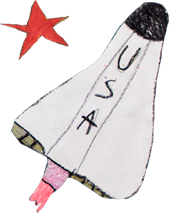Millions in grants honor boy's incomplete life
Reprinted from the Chicago Sun-Times
January 22, 2006
By Jim Ritter
Health Reporter
Children’s Memorial Hospital recently received a $1.25 million grant to study brain cancer in children.
The news didn’t get much attention — big hospitals get big research grants all the time.
But there’s a remarkable story behind this otherwise routine grant. It’s a story that is almost unbearably sad, but also hopeful. It revolves around the incomplete life of a sweet little boy from Highland Park named Rory Deutsch.
Rory was a precocious kid who learned to read before kindergarten and memorized the flags of countries all around the world. In first grade, when his dad took him to a bookstore and said he could buy any book he wanted, Rory picked a thesaurus. Astronomy was his favorite subject. He loved reading about the planets.
‘It’s a very, very bad one’
The first sign something was wrong came in February 1998, a month before Rory’s seventh birthday. During a Saturday tennis class, Rory’s arm began to hurt.
Things went quickly downhill from there.
The next day, Rory tripped a few times while playing. He couldn’t push a computer mouse or make a fist, and the muscles on one side of his face were frozen.
Four days and many tests later, a doctor broke the news to Rory’s parents.
“I’m very sorry,” he told Ross and Mindy Deutsch. “Your son has a brain tumor, and it’s a very, very bad one.”
Medicine has made great strides against some childhood cancers. For example, about 85 percent of children survive leukemia, once a death sentence. But only about 50 percent of children survive brain tumors.
Brain cancer survival rates in children vary, depending on the tumor. Rory’s tumor was the worst of the worst. It was located in the brain stem, in the lower part of the brain. The brain stem is the brain’s Pentium chip, controlling such functions as breathing, heartbeat, blood pressure, salivation, etc.
The fast-growing tumor had infiltrated so deeply that removing it would do more harm than good. Rory had less than a 10 percent chance of surviving two years.
Dr. Stewart Goldman, a specialist in childhood brain tumors at Children’s Memorial, didn’t sugarcoat the news. But he wasn’t brutally honest, either.
“You never take hope completely away,” Goldman said. “There’s a fine line balancing realism with hope.”
The slim hope was that Rory could hang on until a better treatment came along. Rory underwent chemotherapy and high-dose radiation treatments five days a week for six weeks. By May, the tumor had shrunk and most of the earlier symptoms had disappeared. Rory had to wear glasses for a crossed eye, but he otherwise was fine. He played soccer and baseball, took a family trip to New York and returned to school.
Rory wore a baseball hat after losing his hair. In a show of support, his classmates wore hats, too.
‘That was really upsetting’
Around this time, Rory met President Bill Clinton during a Democratic fund-raiser attended by his parents. Rory brought along a book about the presidents, and the president signed it, “Your friend, Bill Clinton.”
The respite didn’t last long. One day in early June, Rory couldn’t pick up a baseball. The tumor had come back, with a vengeance. This time, though, there wasn’t much doctors could do, since Rory’s brain couldn’t tolerate any more radiation.
Later, Rory had to be rushed to the emergency room. He had trouble swallowing and breathing, and he underwent surgery to remove fluid from the tumor that was swelling his brain.
On July 1, 1998, Ross and Mindy Deutsch brought their son home. There was nothing more to do but keep him comfortable.
By this time, Rory had lost his ability to eat or talk. Ross remembers taking Rory’s hand and asking if he was scared. Rory signaled yes by squeezing his father’s hand.
“That was really upsetting as a parent,” Ross said. “It really bothered me that he was scared.”
Ross and Mindy did their best to ease Rory’s fears. And his grandparents were at the house 24/7. Medications kept Rory comfortable, and toward the end, he was sleeping 20 hours a day.
Rory died July 22 at 11 p.m.
From the White House, the president wrote, “Rory had courage and strength beyond his years, and I’m glad that I had the chance to meet him.”
The day after Rory died, his parents founded the Rory David Deutsch Foundation to raise money for research. The foundation’s slogan is “Brighter Tomorrows for Children with brain tumors.”
The first fund-raiser — “Soar to the Stars for Rory” — was held after hours at Adler Planetarium and raised $600,000.
Since then, the foundation has held one big fund-raiser every other year. In off years, supporters hold smaller events and make individual donations.
There are about 4,000 people on the foundation’s mailing list and 50 volunteers, but no paid staff or corporate sponsors. Ross is chairman, Mindy is president. Ross’ sister is treasurer. His mother oversees day-to-day operations, and a family friend provides legal work pro bono.
So far, the foundation has raised more than $4 million.
‘Kitchen table foundations’
More than 100 foundations around the country are dedicated in whole or in part to funding brain tumor research, according to GuideStar.org.
Many are “kitchen table foundations” run by families like the Deutsches, said Naomi Berkowitz of the American Brain Tumor Association. But the Rory Foundation has raised much more than most other family-run foundations, Berkowitz said.
Ross Deutsch, 45, did well as a trader on the Chicago Mercantile Exchange and took early retirement in 2002. “He’s able to appeal to a group that can afford to give generously,” Berkowitz said.
But it’s not just connections that have made the foundation so successful. “Ross is a really great marketer,” said his sister, Ellyn Samsky. “He’s very eloquent and very committed.”
About 40,000 people are diagnosed with brain tumors each year. That’s far fewer than are affected by such diseases as breast cancer or heart disease. Consequently, there’s much less political support for brain tumor research. And drug companies aren’t doing much research, either, because the market isn’t large enough, said Dr. Henry Friedman of Duke University’s brain tumor center.
“It’s very difficult to get adequate research funds,” Friedman said.
The Rory Foundation’s first major grant — $2 million over 10 years — went to the Duke brain tumor center.
Researchers see no cure soon
The second big grant went to Children’s Memorial. Among other things, the money will help fund a study on treating brain tumors with thalidomide. The drug caused thousands of horrific birth defects in the 1950s and 1960s but has shown promise as a cancer fighter.
The foundation is setting aside 10 percent of its grant money to provide grants of up to $5,000 to families affected by pediatric brain tumors.
Researchers say they are unlikely to find a cure any time soon, especially for brain stem tumors. They instead hope to make slow, incremental progress. It might be possible to eventually raise the survival rate to as high as that of childhood leukemia, Friedman said.
If Rory had lived, he would be a freshman in high school, and he would have four younger siblings: Robbie, Rickey, Reggi and Roxi.
Losing a child “is the most horrifying and unimaginable of life’s tragedies, period,” Ross said. “Something good has to come from this. That is the hope and the goal and the dream.”






















